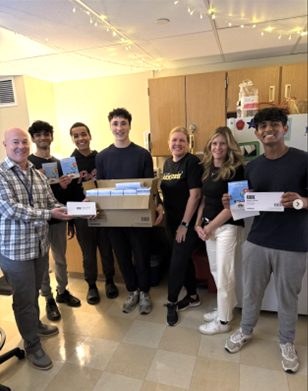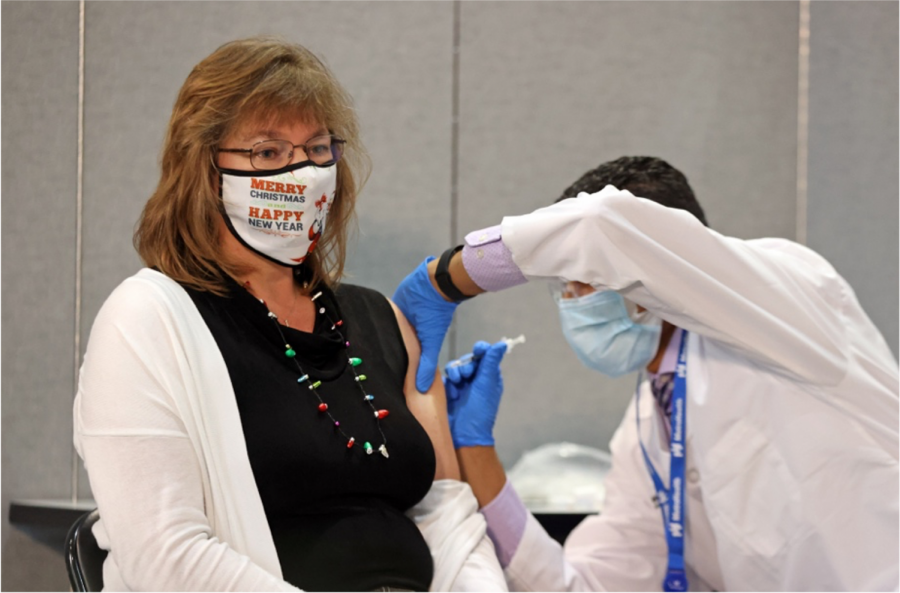A Glimpse into Normalcy: A Timeline of the COVID Vaccine
Q&A with CB West Nurse Mrs. Carol Klein
As COVID cases continue to increase, the widespread distribution of the vaccine comes ever closer. But amidst differing opinions and information in the media, it’s quite unclear what the vaccine distribution might look like for our school. Recently I did a Q&A with our head school nurse, Mrs. Carol Klein. Here are some of the questions I asked her, and her amazingly thorough and helpful responses:
JS: When are the nurses and health staff scheduled to receive the vaccine?
CK: The School Nurses are scheduled to receive our vaccine at the end of this week (1/15). Our second dose will be 28 days after that day.
JS: Are the administrators and teachers in the same category?
KC: All school employees are in the same category. Teachers, administrators, and aides will all be treated in the same regard.
JS: When will they (teachers and other staff) be receiving the vaccine?
KC: We are not sure, but I expect sometime in February. School personnel are in Category 1B. The vaccines are still only being given to those in Category 1A at this time.
JS: Will any students be receiving the vaccine through school?
KC: As of now, there are no plans for this. Students are Category 2, which is when the vaccine will be offered to the general population. The other 3 categories must be completed before moving on to this one. In the past, we had a mass event to vaccinate against H1N1, but there have been no conversations about this type of event.
JS: Which vaccine will the school nurses and staff be receiving: Pfizer or Moderna?
KC: The nurses are scheduled to receive the Moderna vaccine.
JS: What is the difference between the Pfizer and Moderna vaccines?
KC: Both vaccines used the same technology for research and development.
Pfizer has a 95% efficacy rate, and Moderna, 94.1%.
Pfizer is approved for people 16 and older, Moderna for 18 and older.
Both require 2 doses of vaccine to achieve immunity.
Both vaccines may produce simple side effects.
Pfizer has a more stringent storage need than Moderna.
JS: Do you think they will allow vaccinated students into school normally?
KC: I believe we will have to see a large drop in the number of cases before any changes are made to school attendance. We are still operating under the Governor’s orders to wear masks and maintain six feet of distance. This mandate makes it difficult to have students attend school normally, as space is an issue. Both masks and distancing have helped us decrease the spread of COVID.
The experts are hoping to give us herd immunity through vaccines. While there is no magic number, a large portion of the population would need to be vaccinated before this occurs. The issue lies in that we do not know how long immunity will remain, either with the vaccine or with the disease. It is still unknown whether vaccinated people, if exposed to COVID, can transmit the disease.
Research is being conducted about the need to add a COVID vaccine to the annual flu vaccine to continue to keep it at bay. This is going to take some time, as we still do not have all the answers. There are still many questions.
JS: How do you feel about the vaccines only being 16 and up? Do you think there will be a new vaccine for younger kids soon?
KC: I think it is smart to vaccinate the adults. For unknown reasons, children are generally not affected in the same way as adults. If we vaccinate the adults in large numbers, this will offer our children protection as well. I do not think we are close to a childhood vaccine. It is a complicated process due to normal changes in children’s bodies as they grow, and testing concerns.
JS: Do you have any concerns about the vaccine?
KC: When the news of the vaccines began to surface, I was concerned. I have taken many classes about vaccines and the history of development. The pace of the new development was concerning. Since the vaccines were released, I have done a great deal of research/reading about the system for the development of these vaccines. I have no concern about the vaccine. The technology used for the vaccine has been around for 30-40 years, but this is the first time using it in vaccines. The companies followed strict safety guidelines and had large pools of vaccine test subjects. The efficacy is high, and the side effects are minimal.
While we do not have long term studies regarding these vaccines, the issue becomes one of risk versus benefit. An individual needs to decide if taking a vaccine with low side effects is better than taking a chance of contracting COVID and being one of the cases in which the person dies. In either scenario, you are taking a risk. I believe the vaccine risk is much lower than the disease risk.
JS: On a scale from 1-10, how excited are you for COVID to be coming to an end?
KC: 10!!!!!!!!!!!!!!!! This has been a difficult time for everyone. I really miss all of you.
COVID will be with us as we move forward, but we will have the technology and knowledge to keep it under control.









